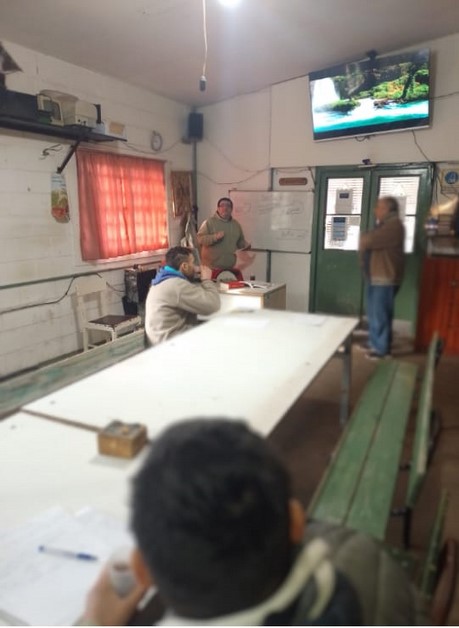Nautical course in our space
Gustavo is a person who is imprisoned in Batán, deprived of his ambulatory freedom, as he tells us when we approach him, and despite this, he decided to pour his knowledge of merchant seamanship and fishing art into informal educational courses, which are offered in I freed.
He says that his state, (in prison), does not prevent him from giving labor knowledge to those who are interested, for tomorrow to know what a job is, to give them the knowledge of what they can do in the context of the free world and with knowledge of what they are going to do, where they are going to get involved, what will be the basis of their performance, in relation to their work.
He mentions that these courses generate interest because they are aware that it is a job opportunity, everyone makes an effort to pay attention to the knowledge provided, and maintains that the participating boys tomorrow can lead to having a boarding passbook that can be used internationally.
When they take the formal course at the National Fishing School or at the Prefecture, they will have prior knowledge that will give them an advantage over others who do not have it.
Generally those who attend the course that I give them like or are interested in knowing what is being dealt with, my teaching mechanism is based on the different fishing gears that exist, for the capture of different species, because each fishing gear fishing leads to a different species.
Also the treatment of the resource that we have, making them aware that our exclusive economic zone is not a supermarket, our fishing maritime resource, what we catch is not a supermarket, we have to process it and bring it to the port to market it for internal and external consumption.
He said that he is trying to make the course last approximately four months, it is divided into two modules, the first deals with nautical notions and the rest with fishing gear.
Concept on training in Liberté
He mentioned that, in matters of training in the diversity of topics, Liberté is an optional place, whoever does it, he said, is out of interest, not out of obligation, it is not that a judge sends him to study, but rather that whoever is trained here is because he wants to do it, and to close he launched the phrase: "he who plays out of necessity loses out of obligation"
Source: Liberte






